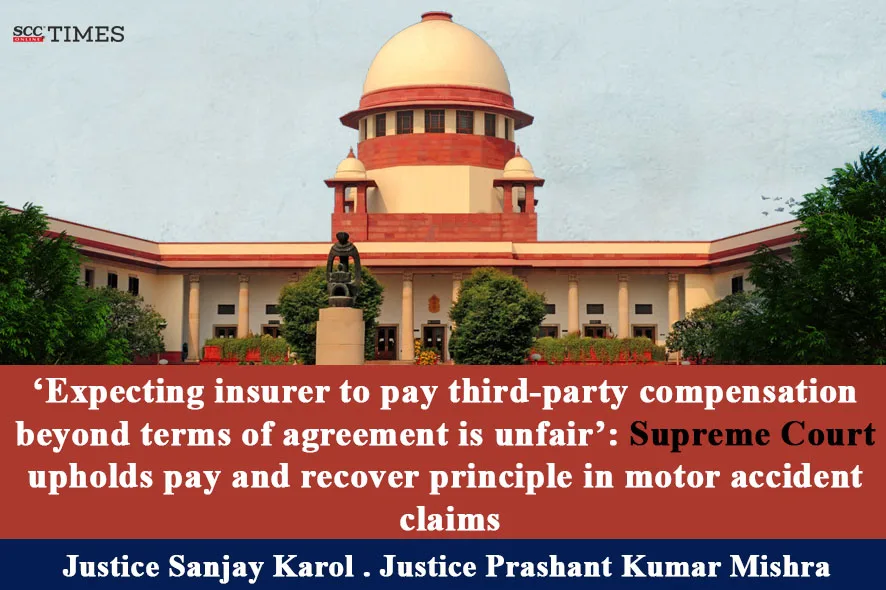Supreme Court: In an appeal challenging the common final judgment and order dated 25-9-2019, passed by the Karnataka High Court (‘the High Court’), wherein pay and recover principle in motor accident claims was applied, the Division Bench of Sanjay Karol* and Prashant Kumar Mishra, JJ., stated that when an Insurance Company takes on a policy and accepts payments of premium, it agrees to do so within certain bounds. The Court explained that the contract lays down the four corners within which such an insurance policy would operate. Therefore, to expect the insurer to pay compensation to a third party, which was clearly outside the bounds of the said agreement would be unfair. Thus, the Court stated that balancing the need for payment of compensation vis-à-vis the interests of the insurer, the order of the High Court applying the pay and recover principle, was entirely justified and required no interference.
Background
On 7-10-2024, the deceased was riding on his motorcycle and was hit by the offending vehicle, in a rash and negligent manner, which resulted in his death on the spot. The dependants of the deceased filed claim petition before the Tribunal seeking compensation of Rs. 50,00,000 with 18% interest, submitting that the deceased was the only earning member of the family and earned up to Rs. 15,000 per month. The Tribunal vide order dated 14-12-2016, awarded Rs. 18,86,000 with 6% interest p.a., taking the notional income of the deceased as Rs. 8,000 per month.
Being aggrieved with the amount of compensation awarded, the appellant filed an appeal before the High Court on the ground that the compensation was not correctly calculated by the Tribunal. The Insurance Company also challenged the Tribunal’s order on the ground of violation by the insurer of the conditions enumerated in the policy.
The High Court vide impugned judgment, reassessing the monthly income of the deceased at Rs. 15,750 per month and by giving 40% towards future prospects. Since, there were four dependents of the deceased, 1/4th of the income was deducted towards personal expenses and compensation under various heads were also determined. The High Court further directed the Insurance Company to satisfy the award as passed by the Tribunal and granted the right to recover the amount from the owner of the bus, i.e., the present appellant.
The question that came up for consideration before this Court was whether any deviation from the prescribed route, would impact the liability of the Insurance Company for any accident which may take place, while the vehicle was on such a deviated route.
Analysis, Law, and Decision
The Court stated that in the present context, the purpose of an insurance policy was to shield the owner/operator from direct liability when such an unforeseen/unfortunate incident takes place. To deny compensation to the victim/dependents of the victim, simply because the accident took place outside the bounds of the permit would be offensive to the sense of justice, for the accident itself is for no fault of his. Then, the Insurance Company most certainly ought to pay.
However, at the same time, the Court stated that when an Insurance Company takes on a policy and accepts payments of premium, it agrees to do so within certain bounds. The contract lays down the four corners within which such an insurance policy would operate. Therefore, to expect the insurer to pay compensation to a third party, which was clearly outside the bounds of the said agreement would be unfair. Thus, the Court stated that balancing the need for payment of compensation to the victim vis-à-vis the interests of the insurer, the order of the High Court applying the pay and recover principle, was entirely justified and required no interference.
[K. Nagendra v. New India Insurance Co. Ltd., 2025 SCC OnLine SC 2297, decided on 29-10-2025]
*Judgment authored by- Justice Sanjay Karol
Advocates who appeared in this case:
For the Petitioner: Raj Bahadur Yadav, AOR; Ajay Kumar, Adv.; M/S. Pba Legal, AOR; Aayush Agarwala, Adv.; Vipul Singh, Adv.
For the Respondent: Nakul Sachdeva, Adv.; Sagar Arora, Adv.; Krishnayan Sen, AOR; Raj Bahadur Yadav, AOR; Pba Srinivasan, Adv.; Amit K. Nain, AOR; Srishti Bansal, Adv.; Sumit Swami, Adv.; Rajshree Dhapola, Adv.; Barnali Paul, Adv.



2014 SCC OnLine Guj 13144 – United India Insurance Company Limited Vs. Minor Mahesh Kanubhai — holding that Sub sec. (4) and (5) of Sec. 149 of the Motor Vehicles Act shall not be attracted in the case of gratuitous passenger travelling in a goods vehicle. In such circumstances, the claims Tribunal would have no power to direct the insurance company to first pay the compensation and then recover the same from the owner. It is the Hon’ble Supreme Court while exercising powers under Article 142 of the Constitution of India can issue such directions.